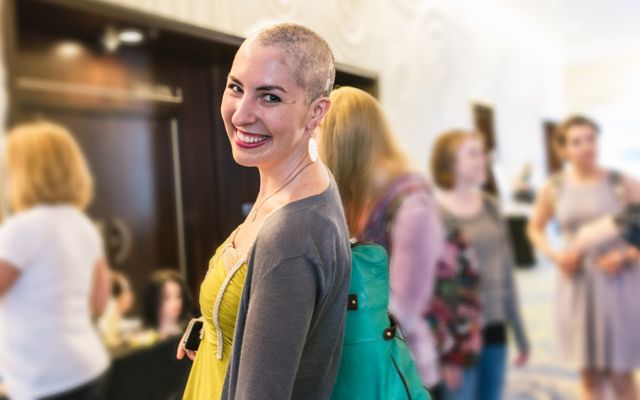My name is Katie and I have been pulling out my hair since I was 8 years old. I am now 25. For most of my life, I was crippled by shame because of my behavior. Some days I spent five hours or more in my closet, pulling out my eyebrows and head hair until my fingers were calloused. I thought no one else in the world did what I did. I believed that if anyone else knew, they would no longer love me or accept me. I believed I was worthless.

Today I am bald and wear a wig. My hair pulling is as bad as ever, and there are days when I want to give up. Sometimes it seems that life is just unfair. But most days, I wake up and do what I do best: I work hard, I write and then balance that out with an episode of “The Bachelor.” I spend time with my family, I go out dancing with friends, and I watch Disney movies with my boyfriend (“The Lion King” still makes me cry). Most of those days, I pull out my hair. All of those days, I know something I didn’t before: I am not alone.
I know I am not alone because I have read, heard and witnessed the stories of thousands of individuals just like me: people, who happen to pull out their hair. People, who happen to pick their skin, or do related body-focused repetitive behaviors. Their voice has given me a voice. Their strength has given me strength, even with my continued vulnerability. I have learned I can be hurt and be strong. I can be vulnerable and be empowered. I am not cured, but I am healing. That healing comes from knowing I am not alone, not in my behaviors, and not in my suffering.
Two out of 50 people have a body-focused repetitive behavior (BFRB). I have 484 Facebook friends, which means about 20 of them are pulling out their hair, picking their skin or doing a related behavior. Most of those friends have never received treatment, and many of them believe they are alone.
Hair pulling, skin picking and related disorders are common, and the suffering that is created by them is universal: pain, isolation and self-hatred. No one should have to feel shame for behaviors they cannot control. Now is the time to end it.
This year, the TLC Foundation for BFRBs and The Mighty are giving us a challenge: To share our voices. They are compiling words from members of the BFRB community to create a force of togetherness and empowerment. We may not have a cure yet for these disorders, but we do have a path for healing. By sharing your voice, you will help someone else feel less alone. You may allow someone a deep sigh of relief. Or, as a hair puller once did for me years ago, you could save someone’s life.
Share a word. A sentence. A story. Anything that you feel will make your voice heard in the way that feels right to you. At the end of BFRB Awareness Week (running from Oct. 1 – 7), The Mighty will create a story that compiles all of your words, completely anonymously.
Make your anonymous submission by clicking here.
Our goal is 100 voices heard by week’s end: that means about 14 of your Facebook friends will know they are not alone each day of this Awareness Week. Be a voice of communal suffering, frustration and ultimate empowerment. Allow yourself and millions more globally to feel a little less alone. I want to help others experience the healing that has saved my life — I hope you will join me, one voice at a time.
Watch the video below to learn more about the BFRBs community and how to find support for yourself and others:

